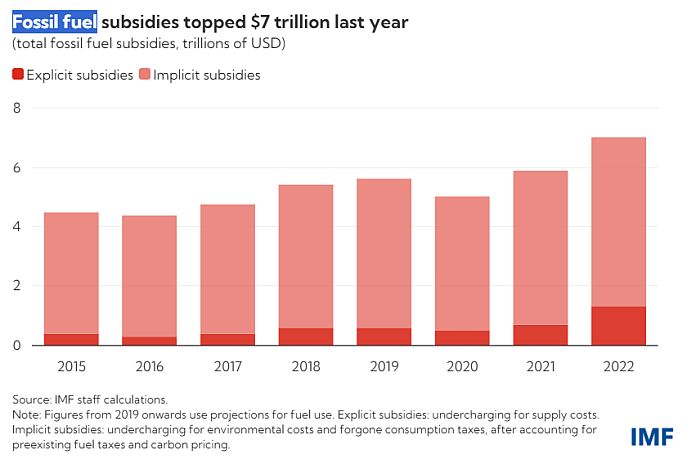– Scaling back subsidies would reduce air pollution, generate revenue, and make a major contribution to slowing climate change
By Simon Black, Ian Parry, and Nate Vernon
Fossil fuel subsidies surged to a record $7 trillion last year as governments supported consumers and businesses during the global spike in energy prices caused by Russia’s invasion of Ukraine and the economic recovery from the pandemic.
As the world struggles to restrict global warming to 1.5 degrees Celsius and parts of Asia, Europe and the United States swelter in extreme heat, subsidies for oil, coal and natural gas are costing the equivalent of 7.1 percent of global gross domestic product. That’s more than governments spend annually on education (4.3 percent of global income) and about two-thirds of what they spend on healthcare (10.9 percent).
Our findings come as the World Meteorological Organization says July was the hottest month on record, underscoring the urgent need to curb human-induced climate change.
As the Chart of the Week shows, fossil-fuel subsidies rose by $2 trillion over the past two years as explicit subsidies (undercharging for supply costs) more than doubled to $1.3 trillion. That’s according to our new paper, which provides updated estimates across 170 countries of explicit and implicit subsidies (undercharging for environmental costs and forgone consumption taxes). Download detailed data for different countries and fuels here.
Consuming fossil fuels imposes enormous environmental costs – mostly from local air pollution and damage from global warming. The vast majority of subsidies are implicit, as environmental costs are often not reflected in prices for fossil fuels, especially for coal and diesel.
Our analysis shows that consumers did not pay for over $5 trillion of environmental costs last year. This number would be almost double if damage to the climate was valued at levels found in a recent study published in the scientific journal Nature instead of our baseline assumption that global warming costs are equal to the emissions price needed to meet Paris Agreement temperature goals.
These implicit subsidies are projected to grow as developing countries which tend to have higher-polluting power plants, factories, and vehicles, along with dense populations living and working close to these pollution sources increase their consumption of fossil fuels toward the levels of advanced economies.
If governments removed explicit subsidies and imposed corrective taxes, fuel prices would increase. This would lead firms and households to consider environmental costs when making consumption and investment decisions. The result would be cutting global carbon dioxide emissions significantly, cleaner air, less lung and heart disease, and more fiscal space for governments.
We estimate that scrapping explicit and implicit fossil-fuel subsidies would prevent 1.6 million premature deaths annually, raise government revenues by $4.4 trillion, and put emissions on track toward reaching global warming targets. It would also redistribute income as fuel subsidies benefit rich households more than poor ones.
Yet removing fuel subsidies can be tricky. Governments must design, communicate, and implement reforms clearly and carefully as part of a comprehensive policy package that underscore the benefits. A portion of the increased revenues should be used to compensate vulnerable households for higher energy prices. The remainder could be used to cut taxes on work and investment and fund public goods such as education, healthcare, and clean energy.
With global energy prices receding and emissions rising, it’s the right time to phase out explicit and implicit fossil-fuel subsidies, for a healthier and more sustainable planet.






